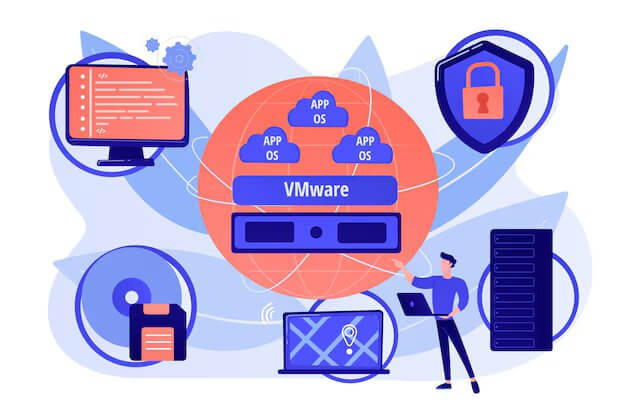Whats a VPS

In today's digital verse, where a website's performance can significantly impact its success, choosing the appropriate hosting solution is vital. Virtual Private Server hosting is a favored option that provides a good balance between cost efficiency and high-level performance.
This solution fills the niche between the lower cost of shared hosting and the high power of dedicated hosting. This article will clarify what a VPS is and explore how its distinct advantages benefit various user types, from novices to experienced tech users.
-
- Virtual private server defined
- How does a VPS work?
- What are the types of VPS hosting?
- Comparing VPS to Other Web Hosting Types
- Virtual Private Server Pros and Cons
-
When Should You Switch To VPS?
- Performance Optimization
- Scalability for Growth
- Security Concerns
- E-commerce Readiness
- Custom Software Requirements
- Reliability and Uptime
- Cost-Effectiveness
- High Traffic Management
- Development and Testing
- Dedicated Resources
- Enhanced Control
- Server Errors and Stability
- Flexibility of Hosting Multiple Websites
- Improved Email Management
- Geographical Flexibility
- How To Choose The Best VPS Hosting Plan For Your Website?
- Ready for Your Own VPS Hosting?
- VPSServer is one of the best choices.
Essentially, a VPS is a virtual machine offered by a web hosting service. Unlike shared hosting, which pools resources among many users, a VPS allocates specific portions of a server's capabilities, like CPU cycles, RAM, and disk space, to individual users. This allocation helps ensure more stable resource availability, which is vital for websites or applications with moderate to high traffic or those that need dependable performance for complex operations.
For beginners, think of this as renting an apartment in a complex. While the complex is shared, your apartment is exclusively yours, meaning you do not have to share critical resources like water and electricity with neighbors.
This autonomy usually results in enhanced security and efficiency when compared to shared hosting. For experts, a VPS allows the freedom to tailor the environment to precise specifications, install bespoke software, and fine-tune configurations for the best system performance.

Our comprehensive guide will walk you through the basics of VPS hosting and compare it to other hosting types, helping you decide why and when a VPS might be the right choice for your web hosting provider needs.
Whether you are starting a new venture, looking to grow an existing business, or seeking a more capable hosting arrangement, grasping the benefits of a VPS is an essential step. Dive into this exploration of VPS hosting and discover how it can serve as the foundation of your online strategy.
Virtual private server defined

A virtual private server is an example of a hands-on server that employs the virtualization methodology to furnish the users with a dedicated share of resources on the server that can be shared with many users. It enables users to work independently up to a similar level of the solution, using one's own operating system with due resources such as CPU, memory, and storage; these are equal to those of a dedicated server. Moreover, the price of this solution is below that of the wholly allocated physical hardware.
Such a configuration provides more vital control, adaptability, and stability compared with shared hosting, which is suitable for organizations that are not yet sure they are ready for dedicated servers but need more customization than this option offers.
How does a VPS work?
Understanding how a VPS works are as simple as renting an apartment in a shared building. Each resident has their own space, equipped with a locking mechanism for individual management. Similarly, with a VPS, users share a physical server but maintain their operating systems. This straightforward metaphor paints a clear picture of the VPS concept.

The Basics of VPS Operation
At the heart of a VPS lies the power of virtualization technology, a highly efficient process that we'll break down for you:
-
Physical Server and Hypervisor: A server is a computer with robust file storage and processing capabilities. In a VPS configuration, the procedure is accomplished by partitioning what we could consider a single large house into many smaller and private units. This task was completed with the help of a tool called a hypervisor. It is just a layer on top of the server's operating system, and this layer splits the server into individual compartments or virtual machines.
-
Virtual Compartments: In each room, there is a VM that works independently and has its resources allocated (like CPU, RAM, and disk space). Plus, each such apartment (as here) has different utilities and services attached. These resources, pulled from the total bloc of resources on the physical servers, are distributed amongst the VPSs.
-
Thanks to the unique capabilities of VPS environments, each virtual area can utilize its operating system. This means that a single physical server can seamlessly run both Windows and Linux, each residing in its own virtual space. The performance of all VPSs is integrated to such an extent that it's comparable to that of a dedicated server, offering you the flexibility and power you need.
Guaranteed Resources
The fact that the VPS provides resources is one of its main advantages. Differing from shared hosting, where the server resources are shared among all the users, a VPS will allocate specific resources for you and only for you. The underlying assumption here is that, as much as the CPU, RAM, and disk space intrinsic to VPS are dedicated to your apps, they will always be available for the applications to function smoothly within them. It is as if you could always use a hose without any concern for a sudden loss of pressure, regardless of how many other residents are using water in the apartment building.

Privacy and Control
The VPS hosts take advantage of the degree of control and privacy they offer. As for VPS, you are free to process any hardware without being restricted by any of your neighbor’s affairs, install any software, and set every setting at your particular will. It is the same as having your own private small-scale company house, but you still benefit from dedicated server power of control.
Efficiency and Cost-Effectiveness
One of the key attractions of VPS hosting is its affordability combined with scalability. This makes it an appealing choice for those who need a hosting solution that not only fits their budget but can also grow with their needs. It delivers CPU, storage, RAM, and all other vital resources as necessitated by your deployment, which makes you spend less on superfluous ones. The provision of developing resources up to your specifications and down as the requirements would suit you prompts you to spend funds on what is relevant, thus maximizing efficiency and effectiveness on resource allocation.
VPS helps put you in your area within a larger server. Through the use of a hypervisor feature, the server will be partitioned into separate allocations with guaranteed resources, thus allowing each unit to run its OS. This is an efficient, secure, and affordable server solution, meaning shared hosting and dedicated servers are two concepts. If you are a start-up website owner, a software developer, or a manager of a small business, a VPS offers a powerhouse platform to build and expand your online presence.
What are the types of VPS hosting?
VPS hosting comes with different plans set aside for both novices and experts, whether you have the technical know-how or not. Essentially, VPS hosting can be divided into three main types: unmaintained server, managed server, and semi-managed server. Now, let us go into how each of the terminologies is defined and who should use it.

Un-managed VPS hosting
The un-managed VPS hosting, together with a DIY web hosting kit, is a concept that you should keep in mind. Here, by the hosting services, only the logic of holding the physical server is the responsibility. In addition to security and monitoring, you are also in charge of every other task, like setting up the server, installing things, updating the server, and sorting out any issue related to the server.
This hosting type is a powerful tool for experts who excel in server management and relish the autonomy it provides. Businesses and developers with proficient in-house Information Technology (IT) teams that can adeptly handle a server infrastructure from the ground up often choose Un-managed VPS hosting.
Opting for un-managed VPS hosting not only grants you extensive customization and control over your services, but it also tends to be the most cost-effective option among the more managed alternatives.
Managed VPS hosting
Managed VPS hosting is akin to having a dedicated crew servicing your server. Your website is hosted, and the intricacies of server management, such as security, maintenance, software updates, and other technical aspects, are no longer a concern. This means that server management tasks like additions, deletions, or changes are handled by the internet service providers, freeing you to steer your business or focus on application development without the burden of server maintenance.

Being a server management service, it is suited for businesses and individuals who understand and use technology and would instead focus their time and resources on other areas. Managed VPS hosting is one of the simplest ways for those who are looking for the power and independence of a dedicated server without the burden of maintaining a VPS.
Semi-managed VPS hosting
Semi-managed VPS hosting represents the optimum option for those who need more time to deal with server management themselves, even if they want to have access to some basic tasks. The conventional hosting type lets the provider manage the physical server and gives technical support for the core software, such as its operating system and basic security measures. Although the client is still liable for managing some system features, such as installing applications and backing up the data, he is somehow managed.
This is the most recommended kind of hosting for tech-savvy people who may also handle some technical jobs themselves but are still interested in supporting essential operations. It proves to be an outstanding alternative solution that could result in budget savings without losing management or supervisory authority.
Comprehending the breadth of the VPS hosting varieties will put you in a much better position to make a more suitable selection, considering your technical expertise and business needs. Whether you want complete control over the server environment or totally depend on the server experts, a VPS hosting solution exists that suits every need.
Comparing VPS to Other Web Hosting Types
Understanding different web hosting solutions is crucial for choosing the proper setup for your website. Each hosting provider offers varying levels of customization, performance, pricing, and service availability. Let's explore how Virtual Private Servers (VPS) compare with other popular forms of hosting, such as shared, cloud, WordPress, and dedicated hosting.
| Hosting Type | Cost | Performance | Customization | Control | Ideal User Base |
|---|---|---|---|---|---|
| Shared Hosting | Lowest | Low; affected by other sites on the same server | Minimal; managed by provider | Limited; no root access | Small websites or blogs with low traffic |
| Cloud Hosting | Moderate to High | High; resources scaled dynamically | Moderate; more flexible than shared | Moderate; more control than shared | Businesses needing high uptime and scalability |
| WordPress Hosting | Low to Moderate | Moderate; optimized for WordPress | Low; limited to WordPress-specific settings | Limited; similar to shared hosting | Users with WordPress sites seeking easy management |
| Dedicated Hosting | Highest | Highest; not shared with other users | Highest; full control over server | Full; complete root access | Large businesses with high traffic and custom needs |
| VPS Hosting | Moderate | High; not affected by traffic on other VPS | High; root access allows for deep customization | High; more than shared, less than dedicated | Small to medium businesses that need balance of cost and performance |
Shared Hosting
Shared hosting goes synonymously to living in a cramped apartment where each roommate shares all facilities with all their roommates. Compared to hosting services, it is the cheapest option and is designed for small websites or blogs with fewer website visitors. The on-site configuration of this structure is such that all the servers' websites share the hardware resources (like CPU and memory) and the software configuration. This will be unpleasant. For instance, if another website on the same server has a significant increase in traffic, your website's loading speed will slow down because of the shared resources. In the same vein, you are also not in control of the server software or the operating system settings; these are managed by the hosting provider, which is related to convenience but at the cost of flexibility.
Cloud Hosting
It is Cloud hosting that provides us with an apartment complex we rent. There, you will be directed automatically to another empty unit if the other unit you were in already had a crowd. This is where a pool of servers is employed to handle traffic while ensuring optimal responsiveness evenly. The failure of one server will not have a business continuity effect if others are there to take over the chores, and whenever such a thing happens, the downtime is almost zero. It is preferable for businesses that need optimal performance, the ability to cut costs, and the timely use of resources.
WordPress Hosting
Specifically tailored for WordPress sites, this hosting type is a variant of shared or VPS hosting that includes WordPress-specific optimizations. Features include one-click WordPress installs, pre-installed plugins, and a setup optimized for the platform. While WordPress hosting streamlines managing a WordPress site, it doesn't offer the hardware customizations that VPS provides but is perfect for users who prefer a hands-off approach.
Dedicated Hosting
Dedicated hosting gives you an entire server just for your website—it's like having an entire house to yourself. This option offers maximum performance, security, and customization but at a higher cost. It's suitable for large businesses with high traffic volumes that require complete control over their hosting environment. Unlike VPS, where you share a server but have separate virtual environments, dedicated hosting gives you all the server's resources without sharing.

VPS hosting vs. shared hosting vs. dedicated hosting
VPS hosting offers the perfect balance when compared to shared and dedicated hosts. It is like a private tenancy in a big house. While you and other users share central resources like the roof and walls (the server), you have your individualized area (the VPS) where you can personalize and customize as you please.
In this mode, managed hosting is capable of acting more flexibly and allocating resources more efficiently. Shared hosting, however, is a less accurate story, where the number of users and their constant need for resources are not solid facts. Furthermore, it is more cost-effective if the local business considers it without ignoring the fact that it still provides many customization, migration, and performance facilities.

VPS hosting is an excellent choice for those businesses that see the development of the company and have directed growth. In addition to scale that grows with traffic spikes, it can use more than dedicated resources just for the sake of it. The VPS is exactly what users need when using the shared host because the VPS has more control and better performance, but it does not require an expensive server or a dedicated server.
Based on these distinctions, you will determine which hosting best meets your website's resource demands, thus balancing the costs, performance, and scalability. Whether you're just starting out or if, due to increased traffic, you need a switch sooner, I would say that there's a hosting type fitting your case type for either scenario.
Virtual Private Server Pros and Cons
It is vital to choose the right sort of web hosting provider that would befit your site in its success and according to your needs; this is where one can probably say that a Virtual Private Server (VPS) could be the solution. Weighing all the positives and negatives of using a VPS will guide you in knowing that it's probably, just probably, the solution for you.
Pros

Performance and Reliability: VPS hosting services offer a much better-performing and more reliable hosting service than shared hosting. Evidence of this can be seen with VPS running on private resources, including bandwidth and processing power, unlike in the shared hosting configuration. This means there is minimal fluctuation in the resources available to you, which enhances the performance of your site.
Isolation from other users: Among the key benefits of VPS hosting are the insulation from traffic surges and technical issues that may emanate from other users on the same server. Your operations aren't affected by another site's high traffic or possible security issues. It offers a stable, predictable hosting environment.
Administrative access and control: VPS affords you the full superuser (root) server access. This level of access allows you to install and manage software and apply unique configurations that otherwise would not be made available within a shared hosting environment. This is ideal for any site that needs customized setups.
Security and Privacy: VPS hosting offers better security and privacy than shared hosting. The reason is simple: all your files and databases will be isolated from other users who share the same server, thus ensuring an outstanding level of safety and privacy for the data residing on your site.
Scalability: As the website grows, it becomes easy to increase the amount of resources, such as RAM, CPU, disk space, and bandwidth, with a VPS. It comfortably allows you to handle more traffic and more loads of data without necessarily moving from the setup of another server.
Affordable: VPS hosting is affordable compared to shared hosting but relatively cheaper than renting an entire server (dedicated hosting). This gives the user an excellent balance of cost and performance, affording those who have outgrown shared hosting but do not require an entire dedicated server a relatively affordable platform to use.
Support and Maintenance: Most of the VPS providers do provide outstanding support and maintenance as part of their hosting plans, thus allowing you to take control of the server administration technical bits.
Cons

Increased Costs Over Shared Hosting: Although a VPS is more affordable than dedicated server hosting, it is still significantly pricier than shared hosting. For smaller websites with fewer demands, shared hosting can be a more economical choice.
Need for Technical Knowledge: Managing a VPS requires considerable technical skill, including tasks like server setup, configuration, and routine maintenance. However, for those who may lack these skills, there is a wealth of tutorials and resources online that can assist.
Intensive Management Required: Operating a VPS involves substantial management duties, particularly ensuring the security of the server and keeping software updated. This management complexity often surpasses that associated with shared or cloud hosting.
Potential for Security Issues: Configuring VPS without consideration of cybersecurity endangers them. In fact, it is vital to put in place robust security procedures that will ensure you are running a safe server and decrease any risks.
Restrictions on Hardware Control: In the virtual realm, the VPS, which doesn't grant direct control over physical hardware, is a significant limitation. This lack of control might prompt some users to switch from the cloud to virtual machines or home servers, seeking more hardware options or fearing data loss. It's understandable to desire more control.
Challenges with Resource Allocation: Resource allocation issues can arise when a host provider lacks sufficient resources or distributes them incorrectly. To avoid such uncertainties, it's crucial to choose a provider carefully, ensuring they can deliver on their promises. This decision is in your hands.
Although VPS offers many advantages, including unmatchable performance, scalability, and more user control, the best of these features come at some costly prices and carry more management responsibilities. Keeping these fundamentals in mind will help you make an informed decision about whether VPS hosting is the right choice for you.
Whether you're overseeing a burgeoning business site, a resource-heavy application, or a substantial e-commerce platform, a thorough understanding of these pros and cons is essential for making an informed choice.
When Should You Switch To VPS?
Even with such features, the quality of your site and security may demand that you upgrade from shared hosting to a Virtual Private Server (VPS). But at what point should one consider shifting to VPS hosting?

Performance Optimization
If a website is too slow or the pages take too long to load, this can indicate that one has outgrown shared hosting. VPS gives you more resources to ensure that the site serves at its best, even when you are adding more content or hosting several visitors.
Scalability for Growth
With your business growing or the number of users on your website increasing, you will have to divert more resources such as bandwidth, storage, and processing power to either meet the needs or upgrade your business and website. VPS hosting provides flexibility closer to the proposition of dedicated hosting, while the resources of shared hosting do not fit the bill of scalability because of the fixed number.
This flexibility offers a unique opportunity to have an improved resource allocation as needs occur, which happens without having the necessity of a brand new server. No matter whether you need to extend a VPS, which is possible with ease in order to satisfy your traffic and data needs, you will not need to migrate your website to a new server. If you continuously see that you are hosting an insufficient amount of users around the world, then that’s an obvious sign that you need to think about moving to VPS.
Security Concerns
Besides, it is your job to manage sensitive information, such as customer data or payment processing. In that case, there needs to be more than shared hosting, and you would need to use more secure hosting, which is something like a dedicated server.
Unlike shared hosting, VPS hosting comes with many more advanced-level security features, like firewalls, SSL certificates, and data backups, to ensure your data is protected. Such security is one of the top vital methods of protecting websites from leaking data, transmission of spyware and malware, and ransomware attacks.

E-commerce Readiness
Running an online shop literally means running e-commerce transactions securely through the hosting solution used. VPS hosting delivers not only advanced security with the system but also fulfills PCI compliance standards required in processing credit card payments. This is critical for e-commerce sites aiming to offer a secure shopping experience to their customers.
Custom Software Requirements
If you need specific applications or software for your website, shared hosting might limit you due to its lack of customization options. VPS allows for the installation of custom software and can support advanced programming needs, giving you the flexibility to use your server the way you need.
Reliability and Uptime
VPS hosting is a reliable choice for maintaining a non-interrupted and stable online presence. Unlike shared hosting, which uses a single physical server and divides resources among multiple virtual computers, VPS hosting is generally more stable and provides consistent performance.
Each virtual server functions independently, minimizing the risk that one user’s problems will impact others. This independence is crucial for preventing downtime caused by overtaxed resources, making VPS a favored choice for those dealing with frequent service interruptions.
Cost-Effectiveness
On the other hand, despite their substantial power, dedicated servers are costly. If you need advanced functions on the cheap, a VPS is a mid-point between low-end dedicated servers and high-end cloud services. It gives better performance and security than a shared host, but only a little money is needed compared to a dedicated host, which demands higher investment.
High Traffic Management
As your website's traffic grows, you may notice that its performance under shared hosting suffers during peak times. VPS hosting providers allocate dedicated resources such as CPU, RAM, and bandwidth, which are essential for managing higher traffic efficiently and maintaining fast loading speeds.
Development and Testing
Developers like VPS as it provides a singular, isolated environment that could be used to check the applications or sites with the test environment without having an impact on live application delivery.
Should you do software development yourself or make frequent changes to your website’s code, you will be able to clone your production environment when you’re ready to make a change and observe its effects without it going live.
It means bringing in these safety checks, which are amidst introducing modifications that have not been thoroughly tested and that may make your live site or application unstable.

Dedicated Resources
Performance is likely to reduce on a shared server if other neighboring users are doing the same task, which means all resources are allocated to each other. VPS means a dedicated resource sort with complete root access, therefore granting you RAM, CPU, and storage that is entirely yours. This is of great importance, especially if the hosting’s performance is one of your website’s priorities and more than one user is using a shared hosting environment.
Enhanced Control
A VPS provides complete control over your hosting environment through root server access, enabling you to install and configure any necessary software. This level of control is essential for installing specific applications or software that are not permitted under shared hosting arrangements.
Server Errors and Stability
Frequent server errors such as '503 Service Unavailable’ can harm your user experience and your website’s reputation. These errors might indicate that your current hosting can no longer handle your website’s demands. Switching to VPS can provide more stable and robust hosting resources to reduce these types of errors.

Flexibility of Hosting Multiple Websites
If you manage websites for multiple clients, VPS hosting providers can be particularly beneficial. It allows you to host several websites independently with adequate resources for each, ensuring that none suffer from poor performance or downtime due to shared limitations.
Improved Email Management
If email is central to your business, a VPS provides much better capabilities for managing emails than shared hosting. With a VPS, you can run mail servers more effectively, ensuring better deliverability, fewer spam issues, and efficient handling of high email volumes.
Geographical Flexibility
VPS hosting provides significant geographical flexibility, allowing you to choose a server location nearest to your primary audience. This type of hosting can also improve website speed and responsiveness, an advantage especially valuable for businesses focusing on particular regional markets.
Transitioning to VPS hosting offers several advantages once your requirements exceed the capabilities of shared hosting. This solution is ideal if you need more resources, enhanced control, or a more dependable hosting environment. VPS hosting offers the adaptability and scalability to custom your hosting needs as your demands grow.
How To Choose The Best VPS Hosting Plan For Your Website?
You, as an Individual, can choose the best VPS hosting plan for the website.
VPS hosting plan selection is often not something a layman understands. There are a number of technical aspects that need to be broken down into simple terms. These instructions are created for everyone, from the native to the most advanced.

Self-Managed VPS Vs. Managed VPS Services
When exploring VPS options, you will typically find two main types of services. Supposing that you were scouring VPS options, you will notice two main types of services in general:
Self-Managed (Unmanaged) VPS: This is known as a high-performance level of shared hosting that gives the server complete control. It is usually for this experience in application control and handling processes and server issues and problems.
Managed VPS: The option transported means the choice of options such as server maintenance, updates, and security carried out by the hosting provider. This meets those who are not technically experienced or do not wish to deal with severe details. This saves you the hassle of operations maintenance and infrastructure or scaling your website and offloads business growth processes on you.
Operating System
Choosing the Right Operating System (OS)
The choice of operating system is crucial for your VPS:
Linux
Most VPS hosting services offer Linux because of its stability, security, and flexibility. Popular distributions include Ubuntu, Debian, CentOS, and Red Hat. As an open-source platform, Linux is usually more cost-effective and customizable.
Open Source
Windows: This is suitable for those using Windows-specific applications. Windows hosting typically comes with additional license costs and offers less customization than Linux.

Reliability and Uptime
Reliability is gauged by uptime, which should ideally be 99.5% or higher. Key features to consider include:
SLA
Service Level Agreement: Ensure that your provider provides a service agreement that provides at least 99.9, if not 100, percent availability.
Hardware and Resources
The performance of your VPS depends significantly on the hardware used by the hosting provider.
Key components include:
SSD Storage: Offers faster data access and improved performance over traditional hard drives.
RAM and Bandwidth: Ensure the plan you choose has sufficient RAM and bandwidth to handle your website's traffic smoothly.
Scalability: Your VPS should grow with your site. Ensure you can upgrade resources like CPU, RAM, and storage easily without significant downtime.
24/7 Customer Support
Quality customer support is essential, even if you choose a managed VPS. Verify that your hosting provider offers:
24/7 Support: Through phone, chat, and ticketing to resolve issues promptly.
Technical Expertise: Support staff should be knowledgeable and capable of assisting with VPS-specific issues.
Backup Service
Regular backups are critical for data integrity and recovery. When selecting a VPS host, consider:
Backup Frequency: Daily or weekly backups can protect your data against loss.
Backup Management: Managed VPS services usually handle backups automatically, but they always confirm the specifics, such as retention periods and recovery processes.
Ready for Your Own VPS Hosting?

Great job on grasping the concept of Virtual Private Servers (VPS)! As your website expands, transitioning to VPS hosting is a clever move. This solution provides the necessary resources and independence to enhance your site's performance, all at a significantly lower cost than dedicated servers.
VPS hosting strikes a perfect balance between affordability and capability, giving you a private slice of server space. This is perfect for websites that need more than their current hosting provider can offer.
Are you considering a switch to VPS? VPSServer.com could be the ideal choice for you. They guarantee a 99.99% uptime and offer a range of managed VPS services to ensure your site remains robust and agile, even during traffic spikes.
Their expert team is always ready to assist with site management, marketing, and more, making VPSServer more than just a provider but a trusted partner in your online journey.
VPSServer is one of the best choices.

VPSServer stands out as a top choice for those exploring cloud hosting and VPS server options, thanks to its extensive global network of more than 20 locations. This widespread presence ensures low latency and high performance, making websites accessible and responsive to users worldwide.
Such capabilities are crucial for everything from tiny blogs to global e-commerce platforms, ensuring that all sites deliver optimum user experience.
At the technological core of VPSServer are cutting-edge components like 2.7 GHz Intel Xeon Skylake processors and NvME SSDs, which provide lightning-fast speeds and efficient data handling.
The use of KVM virtualization technology also enhances security and performance by facilitating direct access to hardware. Additionally, unlimited IOPS capabilities ensure seamless and instantaneous data transfer, effectively supporting high-performance needs.
VPSServer is not only technologically adept but also excels in scalability and customer support. It offers flexible resource upgrades and robust infrastructure to handle traffic surges, paired with 24/7 expert support to assist with any issues.
The blend of cutting-edge technology, adaptable solutions, and committed customer support makes VPSServer a trustworthy and effective host, ensuring your online requirements are smoothly fulfilled.
Frequently Asked Questions
What is the definition of a virtual private server?
VPS is nothing but a virtual private server, a class of shared hosting that offers reasonable cost assurance with reasonably good quality services. VPS solutions involve tricky virtualization technology that allocates user bandwidth to CPU, RAM, and storage, and they cost less than the dedicated server price range.
Each user operates independently on a shared physical server but enjoys a separate layer of resources, mimicking the exclusivity of a dedicated server. This configuration enhances security, efficiency, and performance, making it suitable for websites that experience medium to heavy traffic or require complex processing.
How does a VPS function?
Imagine a VPS leasing an individual apartment within a larger building. Like living in an apartment within a larger complex, a VPS involves sharing the overall structure while maintaining private living spaces. Similarly, a VPS splits a single physical server into multiple virtual servers, each operating independently with its operating system and reserved resources. This setup ensures a dependable and secure hosting space.
What are the primary varieties of VPS hosting?
VPS hosting providers come in three essential forms: unmanaged, managed, and semi-managed. Unmanaged VPS is best suited for individuals with technical skills who prefer to handle their server management tasks independently and fully. Managed VPS simplifies upkeep by having the provider take care of all technical responsibilities. Semi-managed VPS offers a middle ground, where the provider oversees the essential management, but the user still retains some control.
When should you transition to VPS hosting?
Think about upgrading to VPS hosting once your website's needs surpass the capabilities of shared hosting. This includes needing more significant control over your environment, managing higher visitor traffic, or requiring consistent performance for complex applications. VPS hosting allows you to scale resources and ensure efficient operation as your needs grow.
What benefits does VPS hosting bring in contrast to shared and dedicated hosting?
VPS hosting is in the middle ground in terms of resources. It provides more memory and computing power than shared hosting, but it costs much less than dedicated hosting. It enables flexibility in the working environment, enhanced performance, and scalability, which are cheaper when you don't have to have an entire machine just for yourself but use the resources of other people, too. Each VPS is independent, reducing the potential for disruptions from other users on the same server.
How do you select the appropriate VPS hosting plan?
If you are looking for a VPS hosting account, keep in mind that you have to decide between the self-managed and the managed plans, the operating system, Linux or Windows, the type and quality of the server hardware, and support services. It is essential to consider the uptime (99.5% or higher), resources (CPU, RAM, bandwidth), and support (talented team working 24/7) when selecting hosting plans so the website can remain productive and the problems are resolved.
Managed VPS vs. Unmanaged VPS Hosting?
When reviewing VPS server options of hosting providers, one ought to clearly understand the difference between managed VPS vs. unmanaged VPS hosting. In cases managed VPS provider offers, the provider assumes all the server maintenance responsibilities, including even the administration of security patches, and provides continued technical support.
This would be perfect for parties that may not be willing to waste their time in the day-to-day management of server operations. They would be able to focus on their primary business activities without bothering to treat the complexities of hosting operations. On the contrary, with an unmanaged VPS server, the user has complete control of the server, including all maintenance and updating duties.














